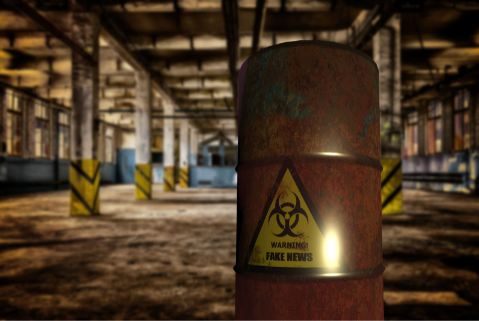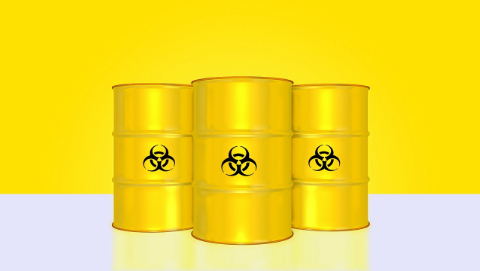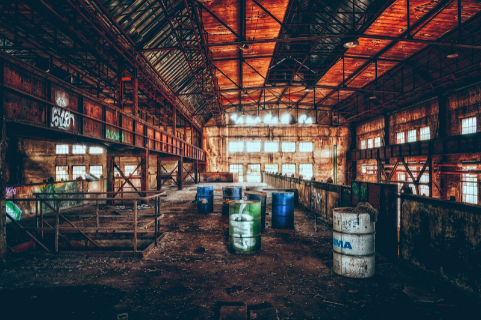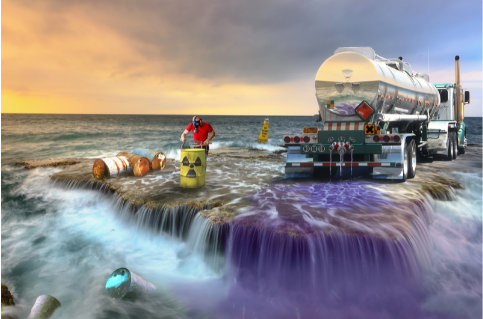Hazardous waste poses a threat to the balance of the earth’s ecosystems , as well as to the health and lives of us all. They are formed as a result of a number of human domestic and industrial activities.

In order not to endanger the environment, hazardous waste should be disposed of properly However, for this purpose it must, of course, be transported to certain hubs specially designed and equipped for processing. Such transport services are subject to a special regime, which means that special permits are required to perform them.
At this stage of human development we have not found a complete solution for the elimination of hazardous waste from our lives. Therefore, various preventive measures are taken against their potential harmful effects.
Features of different types of hazardous waste

Hazardous waste is very different. They can be, for example, both explosive and flammable liquids and solid materials (some of which are self-igniting), there are also so-called oxidants and peroxides, radioactive, biological and toxic substances.
They can even be gaseous – in the form of harmful carbon emissions, for example. Recently, the UN also recognizes plastics as hazardous waste, because their slow or impossible decomposition in natural conditions causes unprecedented accumulation in water basins and other natural ecosystems.
The risk of different types of waste is different, therefore the conditions for transport and storage are different. If the waste is explosive or flammable, it may cause an accident such as arson or explosion.
Radioactive waste
Nuclear waste is among those that carry the greatest risk to our health and the environment . The good news for them is that they are recyclable. There are different ways to do this. For this purpose they must be transported to special processing facilities.

Even if they are not recycled, they must again move to the appropriate places in order to proceed with their disposal.
The most common practice in our country is to bury hazardous nuclear waste . This method is also called “burial”. This method takes a long time depending on the class of radioactive waste. In this way it loses the charge that is still contained in it.
In some countries nuclear waste is immersed in the bottom of large bodies of water (most often oceans), where it stays in special capsules for the necessary time to dispose of it. In Bulgaria, as in almost all of Europe, this practice is not allowed.
Waste of old accumulators and batteries

Old batteries and spent batteries are a rich source of recyclable materials such as mercury, lead, nickel, cadmium, lithium and more. At the same time, their extraction and processing costs money and is also polluting for the environment.
However, in order to be recycled, they also must first reach the recycling points . The same applies to all waste belonging to the category of electrical and electronic equipment (abbreviated WEEE).
Plastic waste
Although they are not reactive, nor corrosive, nor nuclear fissile, nor flammable or explosive, it can be said that plastic garbage is one of the greatest dangers to humanity.
Of course, the most serious threat comes from those types of plastics that are not recyclable . Their uncontrolled accumulation in the environment threatens ecosystems. Recently, scientists have warned us that if we do not stop accumulating non-degradable polymers in nature, in 50 years we will be dealing with a real environmental catastrophe.
Household and industrial chemistry
Waste from chemical and other large enterprises can also be hazardous to nature. Our own homes also generate hazardous waste such as detergent waste and much more. The treatment of domestic wastewater is taken care of by the public treatment plants, and the enterprises are obliged to have the respective installations.
Expired medicines
Many of you may know that old medicines are also waste that should not be thrown away just like that . The most dangerous to be disposed of freely in nature are the drugs we know as cytotoxic and cytostatic. Especially with accumulating more of them , they can do serious damage to the environment.
However, this does not exhaust the list of medicines that can be toxic when disposed of with household waste. Not to mention that the possible mixing of drug residues with other substances in nature can lead to the formation of new chemicals, which in turn are poisonous, explosive and so on.
Also, if we uncontrollably dispose of drug residues, we run the risk of falling into the hands of ill-wishers who abuse them.
In the European Union for households, it is envisaged that drug waste will be dispensed at the nearest pharmacy. This is indeed being done in many countries in Western Europe . In many places special containers for their collection are placed. According to statistics, in France, for example, more than half of all medicines purchased in the pharmacy network are recycled.
Risk optimization for hazardous waste transportation
The most popular method of transporting hazardous waste is with trucks, trailers or semi-trailers. When transporting hazardous waste, experts traditionally recommend choosing the shortest possible route to the respective landfill .
Of course, account must also be taken of the specific features of the infrastructure, etc., which would complicate or facilitate transport.
Regulatory framework and regulation of hazardous waste
Hazardous waste cycle statistics show that the most risky phase is their transport . Incidents and accidents are most likely to occur during this stage.
As a member of the European Union and the UN, our country has fully reflected in its legislation all the important points of the key provisions at both international and regional level.
The regulator in our country, which is responsible for supervision and regulation of hazardous waste transport on the territory of the country, is MOEW . It is the body in charge of preparing the materials and test questions for the relevant licensing examinations to which the carriers take.
Collection of hazardous waste for individuals and households
The municipal authorities in the country have each written down their rules and procedures for dealing with hazardous waste at the household level. In Sofia this usually happens with the periodic organization of mobile points where the respective garbage can be handed over.
On the site Ecoabonament.bg you will find your guide in the field of hazardous waste, and for everything related to ecology.
